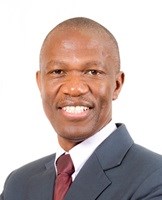
Mosai's contribution to the manufacturing industry includes providing leadership that enhances the competitiveness of South African enterprises, provision of leadership in value-chain competitiveness for the improvement of business processes and upgrading of the value chain competitiveness in the private sector. He also assists in building strategic partnerships and stakeholder management focused on productivity information sharing. Mosai has worked with Productivity SA since 2002 and his current position entails Programmes Administration and Support, Product and Service Delivery, Financial, Tax, Risk and Facilities Management, Human Resource Management, Community, Customer and Public Relations and Revenue Generation.
Sello Mosai: The decrease in manufacturing production is caused by a number of factors. These include electricity disruptions; disruptions caused by industrial action stemming from the social capital deficit in the labour management relations; the decisions and leadership provided by executives and management; as well as the skills and income inequality gaps that exist in manufacturing.
Mosai: The sector has the ability to recover should all stakeholders (management and employees) narrow the gap of trust between the two groups through transparent exchange of information and engagement. Better planning, management, decision-making and monitoring and measurement of productivity and incentivising productivity improvement through equitable sharing of the proceeds of improved productivity gains.
In my view the improvement can happen once there is commitment from leadership (both of unions and management) to commit to effective and fair productivity improvement programmes.
 I believe Productivity SA hosts The Productivity Awards. Could you briefly tell me more about this?
I believe Productivity SA hosts The Productivity Awards. Could you briefly tell me more about this?
Mosai: The aim of the awards is to acknowledge and support companies that continue to play a vital role in shaping the economic future of South Africa. The awards ceremony is an annual event recognising individuals, organisations and communities for their contributions to building South Africa's productive capacity. The awards honours organisations for their contributions to building South Africa's productive capacity.
Awards are conferred in four sectors of:
For more about the awards and entry criteria, go to www.productivitysa.co.za
Mosai: The Manufacturing Indaba is a platform that seeks to enhance South Africa manufacturing competitiveness and aid in strengthening the GDP given the fact that it is the second biggest economic sector. Although South Africa's manufacturing output rose 2.2% year-on-year in volume terms in May 2014, more needs to be done to eliminate obstacles local manufacturers have had to face to remain competitive with their counterparts in other countries.
I will be shedding light on how drivers such as innovation, costs of labour and materials, supplier networks, economy and trade, infrastructure and government investments all play a role in increasing global competitiveness.
Sello Mosai will be presenting at The Manufacturing Indaba which takes place from 29-30 June 2015 at Emperors Palace in Gauteng, South Africa.
For more, go to www.manufacturingindaba.co.za